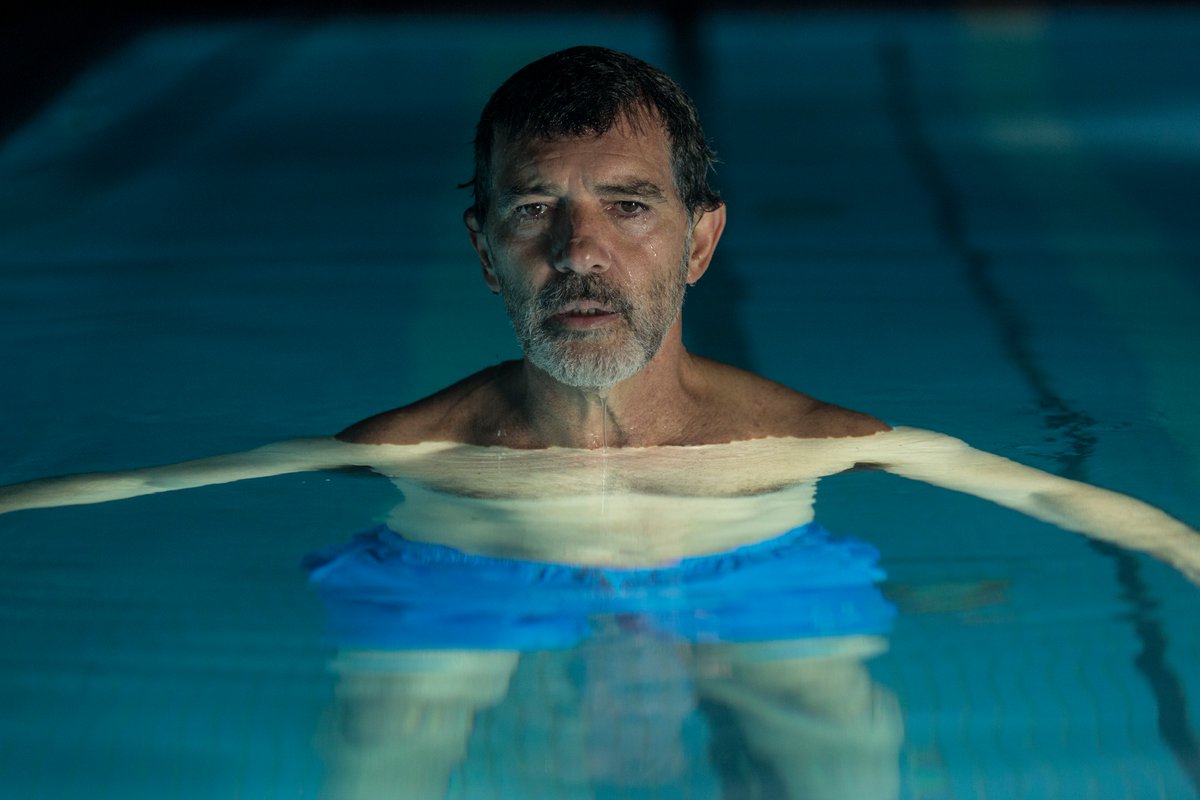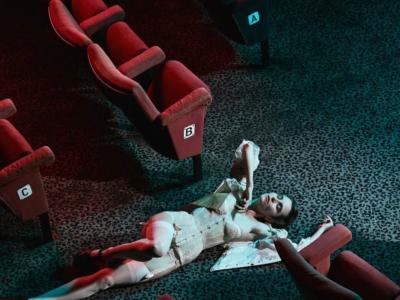Antonio Banderas as Salvador Mallo
Pain & Glory is a moving study of a fading film maker, packed with autobiographical elements. However, as Almodóvar himself points out: “At first, I took myself as a reference, but once you start writing, fiction starts to dictate its own rules and separates itself from its origin.”
Salvador Mallo (Antonio Banderas) plays a has-been film director who is suffering a middle- aged crisis muddling through his existence, having lost his zest for life. Out of touch with the reality around him, suffering and isolated, he lives immersed in recollections and memories of his childhood. He lies prostrate for hours, alone, recalling moments of his childhood that once held meaning for him as he searches for some purpose to his current existence in limbo. Wracked with pain and obsessed by his ailments, he has become a recluse, unable to engage and worse, unable to work on films, the one thing that gave some meaning to his life. “We discover 'cinema' to Salvador is his only salvation in the face of pain, absence and emptiness; and in rediscovering his past, he finds the urgent need to retell his story in order to survive.”
Banderas performance, as Almodóvar describes is: -“Profound, subtle, with a very varied gallery of minute gestures, he has pulled off a very difficult character, full of risks.”

Asier Flores, Penélope Cruz and Raúl Arévalo
Aided by strong medication, including a dalliance with heroin, Salvador relives his life through vivid flashbacks: his childhood in the 60s, with his mother (Penélope Cruz) trying to survive living on the floor of a relative's home where they are unwanted and bullied and, significantly, his father's (Raúl Arévalo in a cameo role) desperate move to a catacomb style cave-home in the Paterna village on the Levante, as they desperately try to improve their quality of life and where Salvador, the child (Asier Flores) first encounters an innocent awareness of his attraction to men.

Asier Flores and César Vicente
Antonio Banderas in this very moving role proves, once again, that he is a powerful presence on screen. The announcement of a restoration of one of his film successes by the Film Institute obliges him to revisit situations that he had avoided for years. He realizes that he must have a reunion with Alberto Crespo, (a compelling performance by Asier Etxeandia) the lead actor of that film, from whom he has been estranged for over 20 years. Crespo, in turn insists on performing a deeply personal script of Salvador, that leads to unexpected encounters with his past life.
There are touches of nostalgia that perhaps could have been avoided, but the long scene with his older ‘mother’ (Julieta Serrano) is a gem to be savoured. True to form, Almodóvar proves, once again, that he has a unique grasp of what a mother is and can be, with all the contradictions and the pain and yet, somehow, manages to soak these scenes with a love for these wonderful, acerbic, zany characters.
Antonio Banderas and Julieta Serrano
Almodóvar: - “There is a sequence in the film where the [older] mother Jacinta says to Salvador ‘If they tie my feet to bury me [they usually do this so that the feet don’t fall to the sides], you untie them and say that I asked you to. Where I’m going, I’m going to need to be travelling very quickly.’ Every time I wrote and re-wrote the scene, I’d end up crying in front of the computer…Jacinta has become a hard, dour woman with the years, and she talks to her son without malice – but with that particular cruelty with which the elderly and the sick sometimes treat those closest to them.”
Penélope Cruz plays his young tough, hard-working rural post-war mother: -
“…as well as struggling to survive each day, like all the women of her generation, there is a quiet bitterness, something like humiliation, which Penélope resolves with delicacy and without gesticulations. I know that kind of woman, I grew up with them. Although we have stripped her of all glamour, Penélope’s beauty emerges, if possible, even more strongly.”
There is an animated sequence in the film (by Juan Gatti) that come across almost like an intermission, that entwines geography and anatomy, travelling around the world and the body, to describe Salvador’s success as a film director and to emphasize his lack of education as a child. It is not that long, but save for giving the film a pause from the dense portrayal of Salvador’s mental and physical suffering, seems not to be needed, and perhaps could have been cut out altogether… it is a series of sci- fi images, like cat scans and x-rays, supported by music by Alberto Iglesias.
Almodóvar himself describes this ‘chapter’ as necessary: - “At the same time, in those same pages, I developed the background into his many health problems, dedicating the minimum time to the matter, without the need to go back over the subject. Pain is very passive, not very cinematic and boring to recount, but I had to mention it in some way to situate the protagonist and explain his eventual self-destructive reaction, his melancholy and misanthropy.

Antonio Banderas and Leonardo Sbaraglia
There is a painful irony in the way addiction played a part in Salvador Mallo’s life, being both the cause of the breakup of his deepest love and the reason they found each other again, as words became the only outlet for his pain. In a very emotional scene, the lovers are able to meet once again: according to Almodóvar, this section moved him the most.
The cinematographer José Luis Alcaine, who has worked successfully with Almodóvar many times, has produced images to remember. The photography is intimate and the illumination with the play of light and the painterly chiaroscuros, has a life of its own, emphasizing the solitude and state of mind of Salvador. Interestingly, the set of Salvador Mallo’s home in the film, is based, in every detail, on Almodóvar’s own house, with his personal possessions, sculptures and books. The DOP even visited the Almodóvar’s home at different times of day to get the right feel for the lighting.

Raúl Arévalo, Pedro Almodóvar and Penélope Cruz.
Pain & Glory (2019) 1hr 55min / Pain and Glory will be in cinemas from 23rd August 2019
Director/ Writer Pedro Almodóvar
Production Agustín Almodóvar/ Ricardo Marco Budé / Ignacio Salazar-Simpson
Music & Songs Alberto Iglesias


















